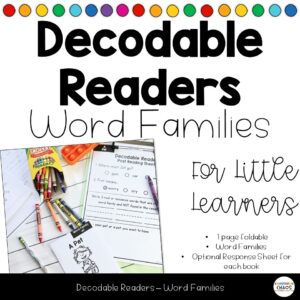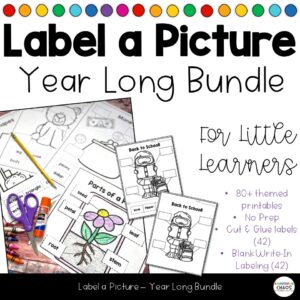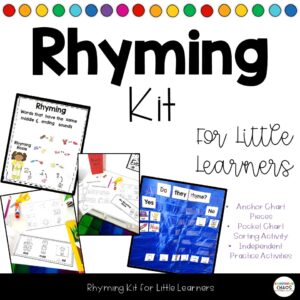
The BIG Elephant in the Room
Hello and welcome to week 4 of our Summer Book Study with The Kindergarten Smorgasboard. This week we are discussing the controversy of phonics and balanced literacy. If you are just joining us, thank you…but don’t forget to go back and read chapters 1-3!
I thought it would be funny to start my thoughts and review on chapter 4, by calling it the Big Elephant in the room. And if you have been teaching for 2+ years, then you probably know why. I can’t even begin to count the multiple conversations and even PD that I have been a part of where Phonics instruction has been the hot topic. I’ve worked with teachers who whole-heartedly believed in whole language and then teachers who demanded our school purchase a phonics curriculum. But what does the research say? And what have I personally seen that has worked and didn’t work.
I’ll start with a personal story. I have 3 kids and all of them went to the elementary school that I taught at. My oldest son is 6 years older than my daughter, so he was already in middle school when my two younger kids started elementary. My kids (and myself) were under 2 different administrations, in which both had different educational philosophies. Interesting. My son was under the principal that believed in Phonics and all of his teachers had some sort of phonics instruction. My daughter and younger son were under the administration of a different principal that did NOT believe in a phonics program. Yes all three of my kids are fluent readers, but my oldest son has a solid foundation of phonics/spelling patterns and is more proficient in decoding words. My other two struggle more with decoding bigger, multi-syllabic words and are TERRIBLE at spelling. Coincidence? I think not. Ironically, I had multiple conversations with the latter principal and his thoughts on why Phonics wasn’t more of a priority. He believed that phonics was centered around memorization and spelling tests and that that was a waste of educational time. He said it was up to each teacher on how to implement phonics. The result was a hodge-podge of phonics skills being taught and not taught. Many students reached 3rd grade with significant holes in their phonics foundation. Our principal had us get together for vertical grade level meetings and discuss the phonics issue, but a resolution never came. Needless to say, I am a huge advocate for a strong, systematic phonics foundation.
This specific chapter discusses the debate between whole word language and systematic phonics. It details what each entails and how the pendulum has swung both ways.
As for a teacher of Kindergarten/Emergent students, I have found that a balance of both are necessary. Note that I did not say Balanced Literacy. That term has also become a bad buzz word recently. Sigh. What I think of when speaking about balance in literacy in the Kindergarten classroom is environmental print, books to read ‘just because’, lots of read and think alouds, a very print rich environment, but also small-group instruction that is fluid and focuses in on remediating and extension of reading skills, including, but not limited to: phonics skills, vocabulary, comprehension and fluency.
Decodable Books
This has ALWAYS been a pet peeve of mine. I will never forget the reading strategist in our school and her beautiful literacy library with leveled books. She frequently encouraged me to come in and get leveled books for my new readers. Of course, DRA was the end of the year assessment and we needed to make sure that our kinders were on a DRA level 3-4 or higher. But I soon found out that these leveled books were not appropriate for my students. There were too many words that they encountered that they could not decode. I brought this up to her and others and squawked about it at meetings. Have students ‘guess’ the word…no thanks. That is guessing and not a reading strategy. Fast forward to me creating my own decodable books. Books that are based on phonics skills that build on each other and are truly decodable.
Tips for a Balanced Approach to Literacy
- READ to your students EVERY DAY! Read informational and non-informational texts.
- Read for fun and enjoyment!
- Do picture walks and think-alouds before and during reading.
- But also find the balance of reading without stopping to ask questions on every page and turning EVERYTHING into a lesson or question/answer.
- Have an organized classroom library and allow students to use it frequently.
- Create a print-rich environment WITH your students
- Students can ‘read’ books that are outside of their ‘level’
- Provide decodables for small-group instruction AND on their way
- Create a writing station and allow students to choose their form of writing
- Teach drawing and details
- Have students write everyday, even if it’s just a game on the whiteboards
- Lots of opportunities to practice learning, including by not limited to reading & writing
What are your thoughts on this chapter? Do you have anything to add to my tips for a balanced approach to literacy?
Decodable Readers that are APPROPRIATE for Kindergarten








